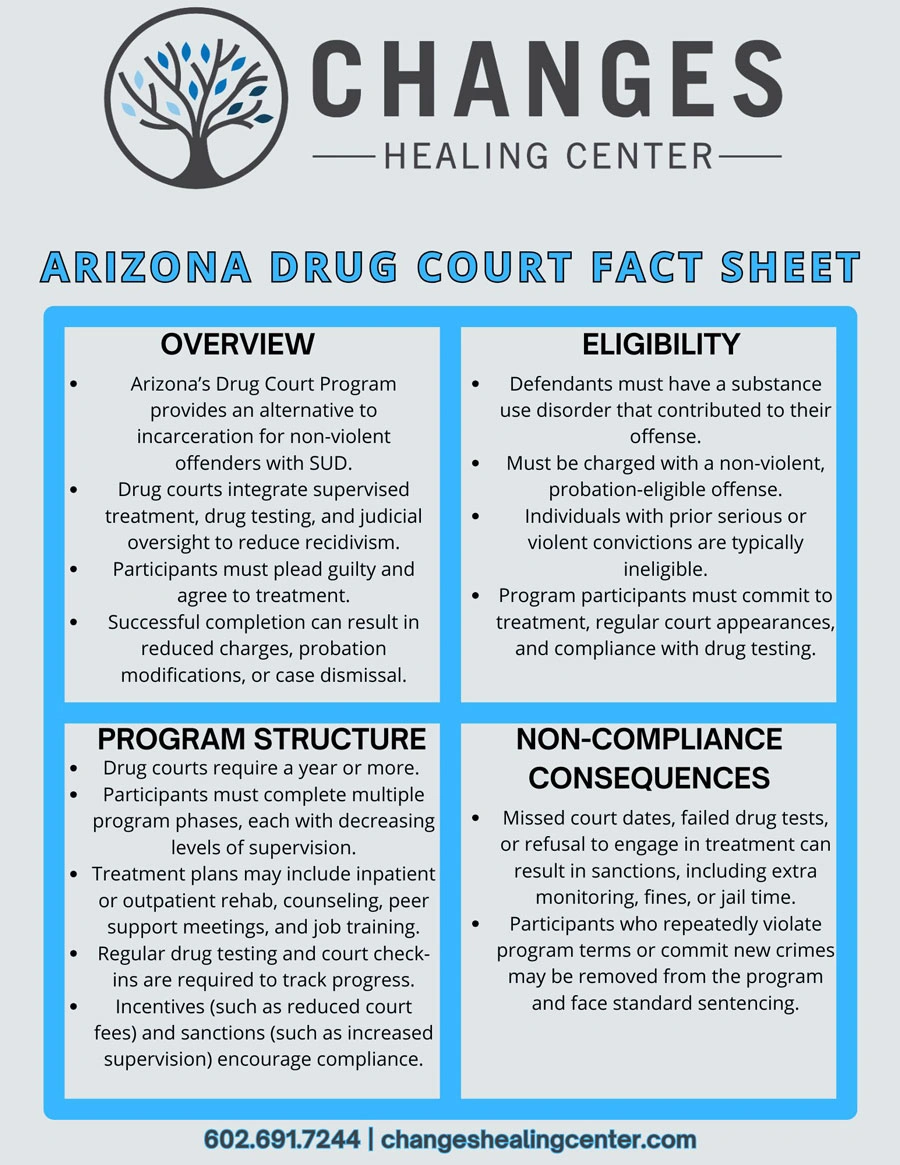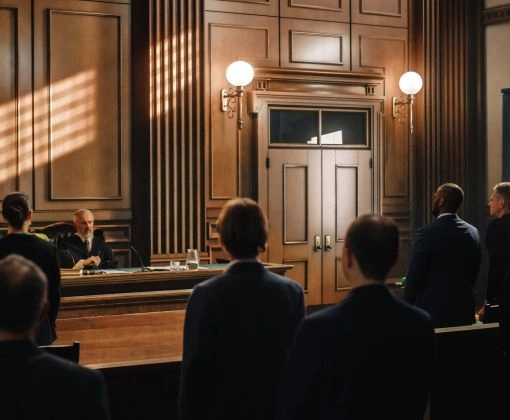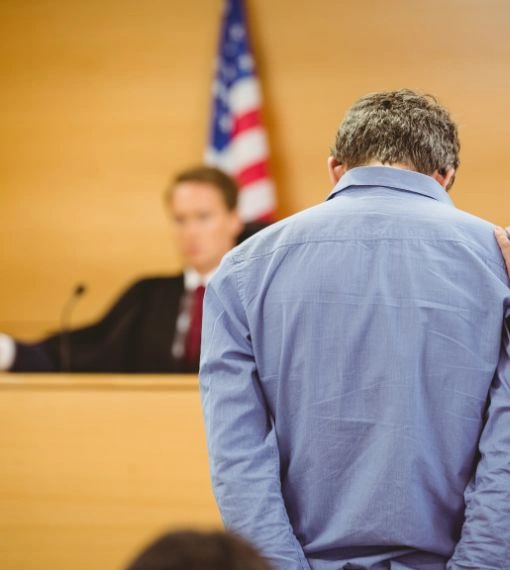Court Ordered Sober Living in Arizona
Everything You Need to Know About Court-Ordered Rehab in Arizona
Table of Contents
Arizona law grants the courts latitude in sentencing people struggling with drugs or alcohol to court-ordered rehab, especially when extending this sentence to first-time, non-violent offenders. But court-ordered sober living in Arizona can be a lifeline for those who struggle with alcohol and drug addiction treatment. Access to mental health treatment can be sparse outside of the state’s largest cities, leaving rural residents without voluntary treatment options.
Changes Healing Center believes that all people with a substance use disorder deserve access to high-quality rehab programs. That’s why our Joint Commission-accredited facility chooses to provide court-ordered treatment. We work closely with the courts to ensure each client in this situation completes court-ordered rehab successfully. If the judge believes someone is worth a second chance, our team is willing to make good things happen.
Please keep reading if you or a loved one must complete a court-mandated treatment program. You’ll learn more about the connection between substance abuse problems, mental illnesses, and legal issues, as well as gain a clear picture of what to expect at the treatment center.
Arizona Drug Court and Drug Rehab Programs for Offenders
The state of Arizona has established Drug Court Programs as an alternative sentencing instead of criminal convictions for non-violent people with substance use disorders. The programs are collaborative and include:
- Judges
- Prosecutors
- Criminal defense attorneys
- Probation officers
- Treatment center providers
The team aims to create customized treatment plans that encompass counseling, monitoring and drug testing, and court supervision. These steps support recovery and reduce the likelihood that the person will re-offend.
Court-Ordered Drug Rehab Centers and Participant Success
You might wonder how helpful drug rehab via legal pressure could be. It turns out that the person who enters treatment for court-ordered drug rehab programs have better outcomes than you might think.
The Impact of Professional Mental Health Treatment on Offenders
The Arizona Supreme Court discussed how recidivism rates for drug court program graduates had low recidivism rates of just 7%. Compare how successful that is when you compare it to the Grand Canyon State’s overall recidivism rate of 36.3%.
Maricopa County, Arizona, reported a 72% success rate with 296 participants in the county addiction treatment program. They also reunified 94% of parents with their children. We would argue that successful reunification can help break the cycle of generational addiction by minimizing trauma on the children.
Coconino County (Flagstaff, Williams, part of Sedona) reported a graduation rate of about 70% over 6 years. Employment rates grew from 51% to 89% once the participants had better emotional regulation and life skills.
It’s not only local counties who agree that these programs are successful. The National Institute on Drug Abuse (NIDA) has found that the courts help increase access to treatment services. However, they still believe there’s much more work to do, especially toward reducing opioid abuse.
Who’s Eligible for Court-ordered Drug Rehab Centers Instead of Jail Time?
Those who receive court-ordered alcohol and drug addiction treatment programs must have non-violent charges and must be considered eligible for this probationary sentence. They must also prove to the judge that substance abuse issues influenced their behavior. People with violent offenses or prior convictions are usually excluded from participation.
The Process When Drug Courts Order Rehab Programs
The offender must appear before a judge and plead guilty; admitting guilt helps the judge believe the person is ready to make real change. The judge will set specific requirements and restrictions.
For instance, the probationer could be required to do any combination of the following:
- Make additional court appearances
- Comply with random drug testing
- Stay employed or in an educational program (if outpatient treatment is appropriate)
- Complete community service hours, as required
- Pay court fees
- Pay restitution to victims
- Commit no additional offenses
- Comply with all probation terms.
After completing the court-ordered treatment, the participant returns to the judge. Completing court-ordered treatment successfully leads to a dismissal of charges, meaning no need to serve jail time.
Why Could the Court System End Someone’s Program?
These programs offer people access to personalized care and a chance to learn life skills they may lack. But the court system has little tolerance for those who don’t attend rehab faithfully or don’t take the probationary sentence seriously.
So, what can get someone booted from the program and possibly even receive an increased sentence?
Repeatedly Failing Drug Tests
The courts might understand that people in the program may have profound substance abuse issues and could slip up. A single instance of a failed drug test can lead to increased monitoring or more frequent random drug testing. But repeat relapses or increases in use can mean revocation of the treatment options and a harsher sentence imposed.
Similarly, tampering with drug testing violates the judge’s order. It’s an instant red flag that will end participation.
Missing Mandatory Court Dates
Court officers must hold program participants accountable for making their court check-ins and therapy sessions. Missing these appointments without a verified reason (i.e, a doctor’s note) is unacceptable. The judge will generally consider this non-compliance with the court-ordered rehab terms.
New Criminal Charges or Violent Behavior
If a program participant commits an altogether new crime, the courts will likely end their treatment programs. Judges do have some discretion with this.
For instance, a disorderly conduct charge might not mean the end of the road as long as no substance abuse created the probation violation. However, committing a felony or violent offense will bring the person’s time at the treatment center to a close.
Non-compliant with Court-ordered Treatment Programs or Making No Progress
Those with court-ordered treatment programs must prove they are becoming a productive, healthy citizen in the supportive environment of the mental health facility. To do this means active engagement in treatment and making progress.
Our outpatient and inpatient programs are based in Phoenix, and, depending on the person’s addiction, can include individual therapy, group counseling programs, learning coping skills, and medication management. Refusing to comply with any part of the program could lead to dismissal.
Drug Treatment Addresses Root Causes of Behavioral Health Issues

A judge’s order to jail time can do more than just help someone get inpatient treatment or outpatient services on a surface level. A criminal conviction can destroy a person’s future job opportunities and income, trapping them in a cycle of poverty. But sending them to court-ordered rehab for substance use disorders can also help them address the root cause of their alcohol or drug abuse.
Here are some of the co-occurring disorders that an effective dual diagnosis treatment facility such as Changes can help them resolve:
Depression and Mood Disorders
Those with untreated depression drink, use drugs, or engage in similar risky behaviors. These come from their feelings of hopelessness and despair. Changes Healing Center provides evidence-based therapies that can manage the depression, thus ending such activity as drug offenses, trespassing, or shoplifting.
Post-traumatic Stress Disorder (PTSD)
Trauma from a single traumatic event or adverse childhood experiences (ACES) can lead to substance use disorder to numb distressing memories and other symptoms of PTSD that require treatment to resolve. Trauma-informed care can replace drug and alcohol abuse with healthier coping tools, ending substance-related offenses, prostitution, and other charges that can mean a criminal history.
Anxiety Disorders
People struggling with anxiety can turn to substance abuse to avoid their responsibilities or regulate their emotions. Treating both the drug use and underlying mental health issues can help them have a better life, one free of drug charges, disorderly conduct, or other minor offenses.
The above examples are just three possible connections between alcohol or drug addiction and other mental health concerns that can lead to committing crimes. We recognize – and can help with – other co-occurring disorders following modern practice. Arizona law also recognizes how closely crime and mental health treatment connect and offers drug treatment and alternative sentences for non-violent, first-time offending individuals.
What to Expect at the Behavioral Health Center

Most clients who come to Changes Healing Center express some uncertainty, whether they came for voluntary treatment or under legal pressure. Each person has a different level of substance use, some with the additional mental health conditions we mentioned earlier.
Because so many factors come into play, your drug or alcohol addiction treatment programs may differ from the services we mention. While broad, the overview should give you a sense of what to expect.
Finding a Balance Between Your Therapeutic Needs and Insurance Plan
We give you the help you need with your first call to Changes Healing Center. Many people with a mental illness find frustrating insurance plan limitations. Legal worries are already triggering enough – we provide insurance verification services to get you approved for maximum benefits.
Based on your unique needs, we request authorization for the proper level of care:
- An inpatient treatment program
- Outpatient services, including an intensive outpatient program (IOP) or partial hospitalization program (PHP)
Call our insurance coordinator with your benefits information, and prepare to share your past recovery efforts, if any. Your lived experiences madetermine whether the insurer approves you for inpatient treatment, PHP, or intensive outpatient services.
Our treatment facility works closely with some of the top group health providers and AHCCCS Arizona Medicaid insurance plans.
Minimizing Withdrawal Symptoms in Medical Detox
Detox, under the supervision of a professional medical staff, safeguards against the most dangerous and uncomfortable withdrawal symptoms. The supportive environment continuously monitors your vital signs and mental or physical pain. We will administer a prescription drug if needed.
Medication-assisted Treatment (MAT) Programs
Addiction treatment doesn’t just mean an abrupt cessation of drug use. In fact, that can endanger people who struggle with alcohol or opioids. MAT offers a less harmful replacement drug that tapers down as you make improvements. It offers the help you need as your brain grows accustomed to the absence of alcohol or opioid drugs.
Effective Mental Health Treatment and Counseling

Licensed behavioral health specialists work with clients receiving inpatient or outpatient services. They use evidence-based therapies to work through the negative thought patterns that contribute to addiction and help you upgrade to a more positive outlook.
Counseling can also include family or group therapy, helping you develop better communication and problem-solving skills.
Avoiding Relapses During Court Ordered Sober Living in Arizona with a Comprehensive Aftercare Plan
Leaving the routine of the treatment center can be exciting but disconcerting. Once you leave the structured setting of the residential or outpatient treatment center, it’s up to you to put your new coping skills into action.
Writing an aftercare plan, or relapse prevention plan, will help you discover ways to stay clean and sober after graduating from your behavioral health program. For instance, you might list local Phoenix AA meetings or NA meetings to help hold you accountable. Or, you might plan to keep your focus off of drugs by enrolling in a new educational program.
Each aftercare plan is highly individual, just like every person – and we’ll help you develop the relapse prevention plan that’s just the right fit for your needs.
Call Changes for Court-ordered Rehab Support Today
Has a judge ordered you to enroll in inpatient or outpatient treatment in a licensed mental or behavioral health center? Changes Healing Center is ready to help. We have experience managing and administering court-ordered rehab and enjoy a terrific success rate.
Call us today – we’d love to learn how we can help you get that fresh start. All calls are confidential, so please reach out now for options.

